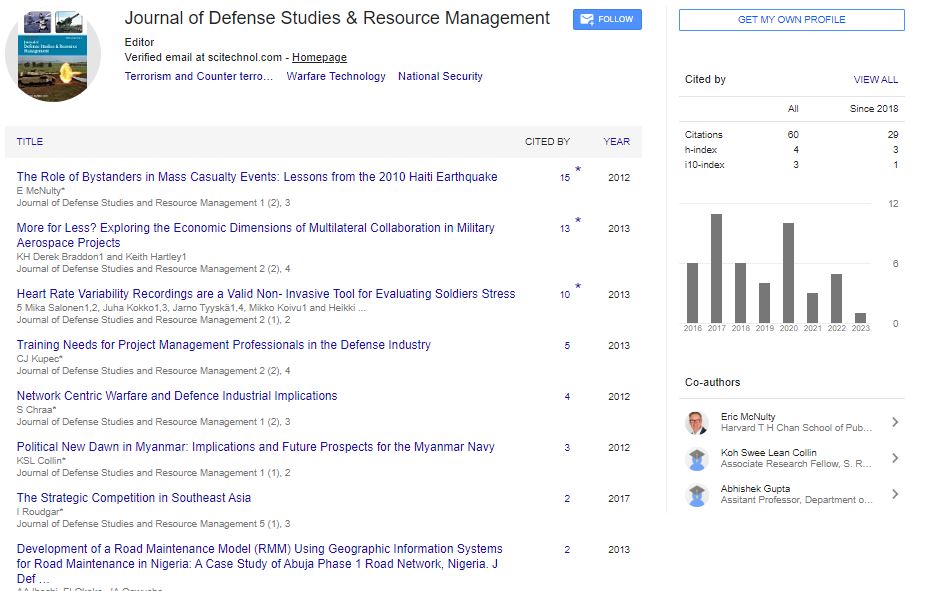Perspective, J Def Stud Resour Manage Vol: 11 Issue: 2
America's Vietnam War: A Nation Transformed and Divided
Julie Korinek*
1Department of Anthropology, University of Massachusetts, Boston, United States of America
*Corresponding Author: Julie Korinek,
Department of Anthropology, University
of Massachusetts, Boston, United States of America
E-mail: Julie22@soc.utah.edu
Received date: 29 May, 2023, Manuscript No. JDSRM-23-107143;
Editor assigned date: 31 May, 2023, PreQC No. JDSRM-23-107143(PQ);
Reviewed date: 14 June, 2023, QC No. JDSRM-23-107143;
Revised date: 22 June, 2023, Manuscript No. JDSRM-23-107143(R);
Published date: 29 June, 2023, DOI: 10.4172/2324-9315.1000173
Citation: Korinek J (2023) America's Vietnam War: A Nation Transformed and Divided. J Def Stud Resour Manage 11:2.
Abstract
Description
The Vietnam War stands as one of the most significant and controversial chapters in American history. Lasting from 1955 to 1975, the war had profound political, social, and cultural ramifications for both the United States and Vietnam. This article aims to provide an overview of America's involvement in the Vietnam War, examining its causes, key events, military strategies, and the impact it had on the nation and its people.
Causes and Escalation
The Vietnam War originated from a complex set of factors, including the Cold War context, the spread of communism, and the desire to prevent the unification of Vietnam under a communist government. The United States initially provided financial aid and military advisors to South Vietnam, supporting its fight against the communist North. However, as tensions escalated, American involvement deepened with the deployment of combat troops in 1965.
Key Events and Military Strategies
The Vietnam War witnessed several pivotal events that shaped its trajectory. The Gulf of Tonkin incident in 1964, which involved alleged attacks on American ships by North Vietnamese forces, provided justification for increased U.S. military involvement. The Tet Offensive of 1968, a coordinated attack by North Vietnamese and Viet Cong forces across South Vietnam, shocked the American public and marked a turning point in public opinion regarding the war. The Vietnam War was a gruelling and unconventional conflict characterized by guerrilla warfare and elusive enemy tactics.
American forces faced significant challenges in combating the North Vietnamese Army and the Viet Cong, who were well-versed in guerrilla tactics and had the advantage of knowledge of the local terrain. The war took a heavy toll on American troops, with high casualty rates and the emotional and psychological impact of an often hostile and unfamiliar environment. The American military employed various strategies during the conflict, including search and destroy missions, aerial bombings, and the widespread use of Agent Orange. However, the guerrilla warfare tactics of the Viet Cong and the elusive nature of the enemy posed significant challenges for the U.S. forces.
Homefront and Anti-War Movement
The Vietnam War sparked deep societal divisions within American society. As the conflict escalated and the casualties mounted, opposition to the war grew exponentially. The anti-war movement gained momentum and became a significant force, mobilizing a diverse range of individuals and groups, including students, intellectuals, civil rights activists, and veterans. Protests and demonstrations became common across the country, with large-scale rallies taking place in cities like Washington, D.C., and San Francisco. The movement aimed to challenge the government's policies and the moral justifications for the war. It questioned the legitimacy of U.S. involvement, criticizing the heavy human and economic costs while arguing for a peaceful resolution. The anti-war movement was not limited to protests alone. It encompassed a wide array of activities, such as draft resistance, conscientious objection, and civil disobedience.
The burning of draft cards, organized draft dodging, and public acts of resistance symbolized the deep-seated opposition to the war among a significant portion of the American population. The movement also found support within the counterculture of the era. Anti-establishment sentiments, coupled with the war's impact on American society, fueled a broader critique of traditional norms and values. Music, art, and literature became powerful mediums for expressing dissent and reflecting the anti-war sentiment. Iconic figures like Bob Dylan, Joan Baez, and John Lennon used their platforms to galvanize opposition and convey messages of peace and resistance. It is crucial to note that the anti-war movement was not a monolithic entity. It encompassed a spectrum of viewpoints and strategies, ranging from peaceful protests to more radical elements that advocated for revolutionary change. However, the movement played a significant role in shaping public opinion and contributing to the growing disillusionment with the war. The Vietnam War also brought to the forefront issues of racial and class disparities in the draft system.
End of the War and Legacy
The Vietnam War concluded with the Paris Peace Accords of 1973, which led to the withdrawal of U.S. troops and a ceasefire. However, the conflict continued between North and South Vietnam, ultimately resulting in the fall of Saigon and the reunification of Vietnam under communist rule in 1975. The war's legacy is profound and multifaceted. The Vietnam War challenged the American perception of its military invincibility and led to a reassessment of foreign policy doctrines. It highlighted the limits of military intervention and triggered debates regarding the ethical implications of warfare.
The Vietnam War also had a lasting impact on veterans, many of whom faced challenges upon their return home. The war's veterans experienced physical and psychological trauma, and the lack of support and recognition from society added to their burdens. Furthermore, the war's impact on Vietnam itself cannot be understated. The conflict resulted in immense human suffering, infrastructure destruction, and long-lasting environmental consequences due to the use of defoliants and unexploded ordnance.
 Spanish
Spanish  Chinese
Chinese  Russian
Russian  German
German  French
French  Japanese
Japanese  Portuguese
Portuguese  Hindi
Hindi 